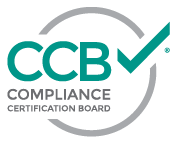Advance Your Career with a Health Care Compliance Certificate
This post-bachelor’s certificate is for health care professionals and continuing students who want to advance their career, mitigate risk for employers and navigate an ever-changing, health care landscape. Students will gain an advanced understanding of health care systems, applicable laws and regulations in the United States, and legal risks inherent to the field.
Taught by accomplished health care professionals and attorneys, this 18-hour certificate is 100% online, on-demand, and has no GRE or LSAT requirement.
This certificate is ideal for:
- Hospital and public health administrators
- Health care compliance officers
- Health insurance compliance officers
- Physicians
- Nurses
- Physician assistants (PA)
- Pharmacists
- Physical and occupational therapists
- Attorneys and paralegals
- Athletic trainers
- Students interested in careers in the health care field
Upon completion of earning a Health Care Compliance Certificate, students will be able to:
- Describe the various laws and regulations that impact the health care industry and the challenges and opportunities they pose for providers, suppliers, payors, patients, and industry partners.
- Integrate laws and regulations into operational policies and procedures to yield best practices for health care organizations and assure compliance in a variety of health care providers and industry settings.
- Analyze ways that governmental, institutional, and professional policies directly and indirectly influence the health care industry
- Identify weaknesses in the health care system and advocate for change in the healthcare system to assure equitable health care for all, that fully complies with all laws and regulations.
- Demonstrate the skills and knowledge necessary to successfully pass the Compliance Certification Board Certified Healthcare Compliance (CHC) certification exam (for students enrolled in the Compliance Certificate option.
- Communicate effectively in a professional, ethical and credible manner.
Tuition and Fees
- Resident & Non-Resident Students — $780 per credit hour
- Technology Fee — $150 per term
Students enrolled in the M.S.L. degree will not be allowed to enroll in courses offered in the J.D. program. Students in the J.D. program will not be allowed to enroll in courses in the M.S.L. degree program.
Curriculum
Students will take 18 hours of required coursework.
Required Courses (18 hours)
The class would serve as a broad introduction to the law and as the introductory class to any Master’s program that may be offered by the Law School in the future. This class would address broad legal concepts such as sources of law, basic principles of contracts, dispute resolution, jury trials, and the risks of litigation. This class would include instruction on creative problem-solving skills using the law and analytical thinking. Finally, this class would include a leadership component.
This course provides a holistic understanding of the various aspects of the healthcare system related to sources of care, sources of payment, and regulatory and other legal systems that constrain and control the behavior of these sources and how these sources impact each other. In the lab component, students will learn methods of legal research to locate sources of health care regulations that require compliance and to collect required information. This course will include a research lab component.
This course will utilize reading materials, case studies, healthcare industry risk management scenarios and data sets provided in class to apply knowledge to specific RM and patient safety scenarios and to use critical thinking skills to solve problems which often result in harm to patients. Through the readings and case study analysis students will learn to identify legal, ethical, administrative, compliance, risk management and patient safety issues and to reach resolutions for the problems presented, even when a clear legal response may not be available, or in the best interests of the patient. Students will also learn how principles of risk management have changed since the 1998 IOM Report and how the changes in our current health care system will further challenge both patients and providers. This report called for increased focus on systemic failures and moving away from a culture of blame to a culture of transparency and learning, utilizing an enterprise risk management model.
This course will lay the foundation for Health Care Compliance by introducing the elements of an effective compliance program, including the compliance operations and the Code of Conduct. It will progress to providing foundational knowledge regarding specific compliance issues facing the healthcare industry such as anti-kickback, Stark, False Claims Act, and civil monetary penalties, conflicts of interest and governance, billing & coding, privacy, technology, data, and security. The link between regulatory and compliance issues and quality of care will also be explored. Students will be assigned projects to demonstrate how to implement, in a specific setting, the various laws, regulations, and standards to assure organizational compliance.
This course covers the requirements for organizations that handle protected health information, especially those required by HIPAA and the HITECH Act. It will include information about which entities need to comply with laws protecting such information and to what extent. It will focus primarily on the privacy, security, and breach response requirements of HIPAA and the information security requirements of the HITECH Act as they apply to both covered entities and business associates.
This course will consider various types of ethical issues that workers in the healthcare field may encounter, including bioethical issues and legal ethical issues that govern lawyers with whom they work. In addition, the course will include instruction on legal and ethical issues surrounding end of life decisions.
*This requirement may be waived if a student has a J.D. degree or equivalent prior legal experience; in substitution, the student will be required to take one 3 credit elective from the MSL program.
Admissions
- Resume/CV
- Bachelor’s degree from an accredited university
- Undergraduate degree performance
- GRE or LSAT scores (optional)
- Statement of interest in the program
- Two recommendations from professional or academic references
Master of Studies in Law (MSL) in Health Systems Law
Ready for a health care related master’s degree? Check out our Master of Studies in Law in health systems law degree program.
Compliance Certification Board (CCB)® Accreditation

The Healthcare Compliance Certificate Program and the Master of Studies in Law in Health Systems Law (MSL) at the Joseph F. Rice School of Law, University of South Carolina are accredited by the Compliance Certification Board (CCB)®.
This accreditation affirms that both programs meet the rigorous standards set by the CCB for training and education in healthcare compliance. As a result, students who complete either the certificate or the MSL degree are eligible to sit for the following CCB certification exams:
- Certified in Healthcare Compliance (CHC)®
- Certified in Healthcare Privacy Compliance (CHPC)®
- Certified in Healthcare Research Compliance (CHRC)®
- Certified Compliance & Ethics Professional (CCEP)®
- Certified Compliance & Ethics Professional–International (CCEP-I)®
The CCB’s evaluation included a site visit and comprehensive review of the curriculum, faculty expertise, advisory board contributions, and institutional support. The accreditation team noted the program’s strong alignment with industry standards and its commitment to preparing professionals for leadership roles in healthcare compliance.
This recognition also supports ongoing collaboration between the Rice School of Law and the CCB, including opportunities for joint educational initiatives, thought leadership, and professional development for students and alumni.
Want more information?
Please fill out our program inquiry form and a representative will be in touch shortly.
